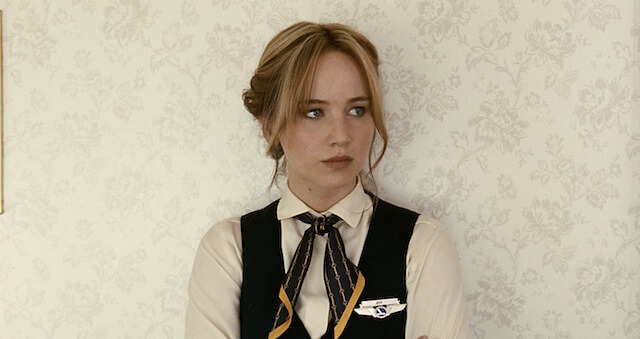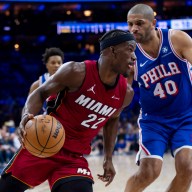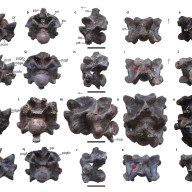‘Joy’ As recent as six years ago David O. Russell was persona non grata: an auteur too singular and too troubled to get a movie off the ground. The dizzying, eccentric “I Heart Huckabees” was seen (by some) as too out there even before footage of the director screaming at actor Lily Tomlin between takes went viral; his health care satire, “Nailed,” died mid-shoot. (It was cobbled together and released, without his aid, earlier this year with the new, gross name “Accidental Love.”) Then he made an improbably rousing comeback, with an underdog tale, appropriately enough: “The Fighter,” the first in an unlikely renaissance, which found a turbulent artist reborn as a populist with “Silver Linings Playbook” and “American Hustle.” Russell, it can be (and has been) argued, may have gone too far the other way. His earlier works — including “Spanking the Monkey,” “Flirting with Disaster” and “Three Kings,” plus the great “I Heart Huckabees” — were critical darlings that only slightly connected with the mainstream. Since “The Fighter” the inverse has happened: though he’s still “acclaimed,” it’s in the fashion dubbed “Oscar-friendly.” He has passionate detractors, including the very ones who were early cheerleaders. RELATED:The Top 10 best films of 2015 (and 20 more that are great too) The truth about Russell lies somewhere in between. He’s no bland Ron Howard, but he has sanded down some, though far from all, of his edges. His characters, always overly passionate babble-mouths who tend to scream over each other while cramming into whirling dervish frames, used to be darker. Now they’re overtly lovable, even when they’re off the skids. Even the most venal character in “American Hustle” is “fun.” And yet Russell’s gift for creating controlled chaos remains peerless, and his view of American go-getterism is still stealthily and usefully cockeyed. “Joy,” the fourth film after the filmmaker’s comeback, continues Russell 2.0, and you can even be weary with the brand, as we tend to get in the moment. Here’s yet another combustible family of lunatics scampering about snaky long takes; here’s yet another charismatic Jennifer Lawrence performance opposite an on-edge Bradley Cooper; here’s yet another mixed paean to American exceptionalism. “Joy” may seem more of the same, but it’s smaller than “Hustle” and also more focused, as though he was trying to pare his new shtick down to its essence. Having lampooned/idolized grifters in “American Hustle,” Russell turns to a straight-up loving portrayal of the petit bourgeoisie — or at least one of them. It follows Lawrence’s Joy Mangano, a single mother who, in the 1990s, invented the Miracle Mop and struggled to turn it into the QVC-bred cash cow that it became. She succeeded by sticking to her guns, overcoming absurd obstacles and both dealing with and enlisting the aid of her nutty family, including her divorced parents (Robert De Niro and Virginia Madsen), her aspiring singer ex (Edgar Ramirez), her dad’s new boo (Isabella Rossellini), etc. — many of them crammed into her crumbling Long Island home. The hornet’s nest of insane people is the most shopwornpart of “Joy,” but they eventually chill out, namely when Joy — the dominant breadwinner and a possible inventor-genius — finally ventures out on her own, with them becoming a mere support system. The best stretch of the film is the least like any Russell film thus far: Joy winds up at QVC HQ, where an exec (Cooper) shows her and the viewers how the online shopping business works, step-by-step. What follows in the wake of her initial, hard-won success is stranger-than-fiction while it plays with Russell’s suspicious view of success. The world of small business proves as cut-throat and shady as its big-time counterpart, all of it intended to grind the dashing but easily shellshocked Joy into the ground. RELATED: Interview: Gugu Mbatha-Raw says ‘Concussion’ isn’t anti-football “Joy” could be ingested as a stock tale of perseverance and dream-following, but dressed up in an eccentric filmmaker’s clothes. But it has a real anchor in Lawrence, who manages to be both charismatic and more or less sane — not just another nut. As her successes and subsequent hiccups grow, she becomes quieter, more reserved — not unlike the wide-eyed shellshock she displayed in “The Hunger Games”es. By the end, we’re not even sure if what has happened to her has been entirely for the good — that she may have, despite her better efforts, been forced to become part of the machine, even if she’s one of its more good ones. It’s not clear where Russell can go next, and even if he keeps repeating this formula perhaps it’s more productive to point out where he’s staying his stubborn self, not playing ball with the big leagues. “Joy” might even be best read as autobiography: a tale of someone else who found an unusual place in a cruel and dangerous world, selling something that’s genuinely useful. After all, any film that marries a strong Jennifer Lawrence to an unflattering portrayal of what it takes to win shouldn’t be taken for granted.
Director: David O. Russell
Stars: Jennifer Lawrence, Robert De Niro
Rating: PG-13
3 (out of 5) Globes
‘Joy’ is more than another Jennifer Lawrence-David O. Russell nut-a-thon

Merie Weismiller Wallace
Follow Matt Prigge on Twitter @mattprigge

















